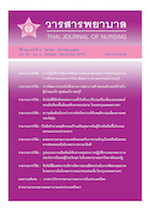ปัจจัยทำนายพฤติกรรมสร้างเสริมสุขภาพใน ผู้ป่วยโรคไตเรื้อรังระยะแรกและระยะปานกลาง
Main Article Content
Abstract
การวิจัยเชิงบรรยายนี้ มีวัตถุประสงค์เพื่อศึกษาปัจจัยทำนายพฤติกรรมสร้างเสริมสุขภาพในผู้ป่วยโรคไตเรื้อรังระยะแรกและระยะปานกลาง โดยใช้แบบจำลองการสร้างเสริมสุขภาพของ Pender เป็นกรอบแนวคิดในการวิจัย กลุ่มตัวอย่างคือ ผู้ป่วยโรคไตเรื้อรังระยะแรกและปานกลาง จำนวน 107 ราย ที่มารับการรักษาที่คลินิกโรคเบาหวานและคลินิกโรคความดันโลหิตสูง ในโรงพยาบาลนากลาง จังหวัดหนองบัวลำภู เลือกแบบตามสะดวก เครื่องมือวิจัยเป็นแบบสอบถาม จำนวน 5 ชุด ประกอบด้วย 1) ข้อมูลส่วนบุคคล 2) การปฏิบัติพฤติกรรมสร้างเสริม สุขภาพ 3) การรับรู้ประโยชน์ต่อการปฏิบัติพฤติกรรมสร้างเสริมสุขภาพ 4) การรับรู้อุปสรรคต่อการปฏิบัติพฤติกรรมสร้างเสริมสุขภาพ และ 5) การรับรู้สมรรถนะแห่งตนในการปฏิบัติพฤติกรรมสร้างเสริมสุขภาพ วิเคราะห์ข้อมูลโดยใช้สถิติเชิงพรรณนา และการวิเคราะห์การถดถอยพหุ
ผลการวิจัยพบว่า ปัจจัยที่สามารถทำนายพฤติกรรมสร้างเสริมสุขภาพมี 3 ปัจจัย ได้แก่ การรับรู้ประโยชน์ต่อการปฏิบัติพฤติกรรมสร้างเสริมสุขภาพ (β = 0.361, p < .001) การรับรู้อุปสรรคต่อการปฏิบัติพฤติกรรมสร้างเสริมสุขภาพ (β = -0.228, p < .05) และอายุ (β = -0.197, p < .05) ตามลำดับ ปัจจัยทั้งสามสามารถอธิบายความผันแปรของพฤติกรรมสร้างเสริมสุขภาพได้ร้อยละ 44.7 (R2 = 0.447, p < .001)
Factors predicting health promoting behaviors in patients with mild to moderate stages of chronic kidney disease.
Kitipim, S., Pinyopasakul, P., & Sriyuktasuth, A.
The objective of this descriptive research was to examine factors predicting health promoting behaviors in patients with mild to moderate stage chronic kidney disease. Pender’s Health Promotion Model was used as a conceptual framework. The sample of 107 patients with mild to moderate stages of chronic kidney disease attending the Diabetes and Hypertension Clinics at Naklang Hospital, Nongbualamphu Province, was selected by convenience sampling method. Five questionnaires were used in the study including: 1) demographic data; 2) health promoting behaviors; 3) perceived benefits to health promoting behaviors; 4) perceived barriers to health promoting behaviors; and 5) perceived self-efficacy in health promoting behaviors. The data were analyzed by using descriptive statistics and multiple regression analysis.
The results showed that there were three factors that could predict health promoting behaviors, including perceived benefits to health promoting behaviors (β = 0.361, pexplain the variance in health promoting behaviors 44.7 percents (p < .001).


